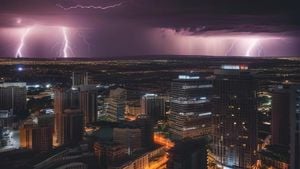Travelers heading to and from Bali, Indonesia, have found themselves facing significant disruptions due to the eruption of Mount Lewotobi Laki-Laki, which has sent plumes of volcanic ash racing toward the skies. This natural disaster has led to numerous flight cancellations and delays, stranding passengers at Ngurah Rai International Airport and other areas. On November 13, 2024, the chaos began to escalate as the volcanic activity intensified, causing airlines to take swift action.
Ahmad Syaugi Shahab, the general manager of Bali's I Gusti Ngurah Rai Airport, stated, "22 international flights were cancelled on Tuesday due to volcanic ash." The ash cloud has primarily impacted international routes, with significant cancellations affecting flights to major Australian cities like Sydney, Melbourne, Adelaide, and Brisbane as well as services to South Korea's capital, Seoul.
The situation continued to worsen on Wednesday, as authorities worked to assess the impact of the eruption. Many passengers were seen frantically glancing at the flight information boards, only to find their scheduled departures listed as canceled or postponed. Airlines didn’t just halt international operations; they also canceled around twelve domestic flights, leaving many travelers disoriented and inconvenienced.
Passengers found solace, albeit minimal, as airlines began offering options for refunds or the chance to reschedule flights. The void left by Mount Lewotobi's eruption came during one of Bali's peak tourist season, adding to the frustrations felt by those planning vacations on the picturesque island.
Travelers at Lombok Airport, located nearby, were also caught up in the wave of cancellations. Arif Haryanto, spokesperson for PT Angkasa Pura I at Lombok Airport, confirmed, "All domestic and international flights were suspended on Tuesday," impacting routes not just within Indonesia but also international destinations like Singapore and Malaysia. Preliminary reports indicated approximately 30 flights at Lombok Airport were canceled, affecting nearly 6,000 passengers.
Geologists and volcanologists have been carefully monitoring Mount Lewotobi as it continues to display signs of unrest. Active volcanic regions like this are typically observed obsessively, especially during eruptions. Mount Lewotobi, prominent on the island of Flores, is notorious for its explosive activity, making it one of Indonesia's more closely watched volcanoes.
Emergency services worked tirelessly to keep local people safe, ensuring proper evacuation procedures were initiated for those living near the volcano. Authorities are emphasizing safety as their primary concern. Residents were alerted and advised to remain vigilant as the volcano continues to emit ash.
The interruption of flights is not only affecting travelers but also businesses reliant on the tourism sector. The local economy, buoyed by travelers seeking the island's sandy beaches and lush landscapes, faces uncertainty amid the disruption. Hotel owners expressed concern about the potential long-term impacts on reservations and occupancy rates as the news of the eruption spreads globally.
While local tourist agencies are streamlining their efforts to cater to potential short-term travelers stuck on the island, it's evident the repercussions of such natural events extend far beyond the immediate. The interruption of air travel and influx of confused tourists could take weeks, if not longer, to fully rectify.
Experts recommend travelers stay updated on the situation through reliable news sources and remain flexible with their plans. The aviation industry has not only halted services due to immediate threats to safety but is also recalibratedto accommodate eruptive threats going forward. It's always wise for those planning travel to volcano-prone areas to remain informed about volcanic activity and heed any advisories issued by local authorities.
Authorities remain hopeful for conditions to improve. Jetstar, one of the notable Australian airlines, announced it had paused flights to Bali until at least Thursday. Indications are spreading about the likelihood of continued volcanic activity, keeping all stakeholders on edge.
Indonesia, home to about 130 active volcanoes, is familiar with such events, and over the years, it has developed extensive protocols addressing volcanic eruptions. Nonetheless, each eruption, large or small, invariably brings lessons learned and areas ripe for improvement.
The volcano's activity exemplifies the unpredictability of nature and serves as a reminder of the delicate balance between everyday life and the power of the earth beneath our feet. The hope is, as ever, to return to normalcy without any loss of life or significant damage to both property and the vibrant tourism scene Bali is known for.



